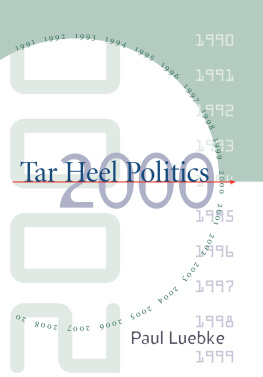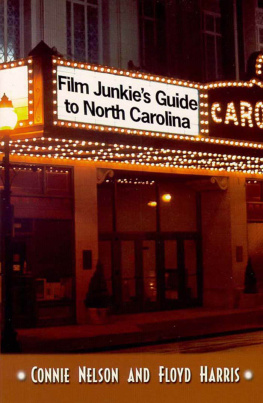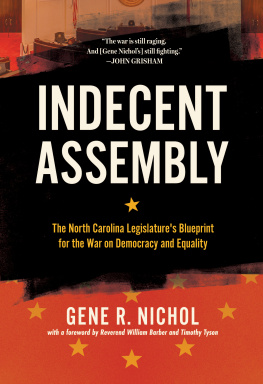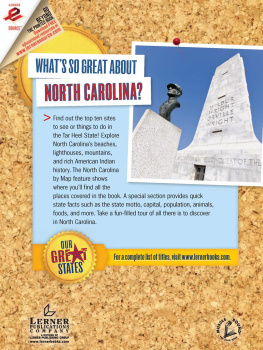1998 Paul Luebke. All rights reserved
Designed by April Leidig-Higgins
Set in Monotype Garamond by Keystone Typesetting, Inc.
Manufactured in the United States of America
The paper in this book meets the guidelines for
permanence and durability of the Committee on
Production Guidelines for Book Longevity of the
Council on Library Resources.
Library of Congress Cataloging-in-Publication Data
Luebke, Paul. Tar heel politics 2000 / Paul Luebke.
p. cm. Includes bibliographical references and index.
ISBN 0-8078-2452-6 (cloth: alk. paper)
ISBN 0-8078-4756-9 (pbk.: alk. paper)
1. ElectionsNorth Carolina. 2. Political parties
North Carolina. 3. North CarolinaPolitics and
government1951 . I. Title.
JK4190.L84 1999 98-16381
324.9756043dc21 CIP
02 01 00 99 98 5 4 3 2 1
Preface
North Carolina, for most of the twentieth century, has enjoyed a reputation as a progressive state. This is in part true. To the extent that the state from a national, especially northeastern, perspective is ridiculed as the home of U.S. Senator Jesse Helms, such ridicule misses the point. Helms is in fact not typical of North Carolinians and stands on the right wing of even the North Carolina Republican Party.
In fact, long before the ascendancy in Washington, D.C., of Jesse Helms, North Carolinas national reputation rested on the political vision of the states corporate and governmental elites. In marked contrast to virtually all other southern states, North Carolina by the late 1930s had established a centralized state government that provided the basic infrastructure for economic development (highway construction and a statewide investment in public schools and university education, especially at the Chapel Hill campus). North Carolina at that time had also in place tax structures (a corporate income tax, an individual income tax, a general sales tax, and a sales tax on motor fuels, among others) that could have been a model for any of the forty-eight states. By contrast, even today both Tennessee and Florida raise state revenue without the individual income tax and thus lack what most students of public finance consider a fundamental mechanism to avoid unduly high taxation of middle-income and poor citizens.
Despite North Carolinas long-standing reputation for progressivism, the term progressive should be applied cautiously. The reality is that the states political debate remains firmly controlled by two well-institutionalized economic elites with somewhat conflicting interests. One group, the modernizers, consists of bankers, developers, retail merchants, the news media, and other representatives of the business community who expect to benefit from change and growth. The second group, the traditionalists, includes traditional industrialists (in textiles, furniture, and apparel), tobacco farmers, and others associated with the states agricultural economy who feel threatened by change and growth. Each group is linked with politicians who represent its interests.
Any progress felt by middle- and low-income North Carolinians has tended to trickle down from actions that modernizers have taken in pursuing their own interests. The political scene has changed substantially since World War II, primarily with respect to the major roles that Republicans and blacks play now compared with a half-century ago. Nevertheless, North Carolina remains what V. O. Key called it in his classic book, Southern Politics (1949), a progressive plutocracy. This is the reality of Tar Heel politics.
Two myths stand out about North Carolina politics. The first affords to modernizers a status of would-be liberalism. That is to say, a Terry Sanford or a Jim Hunt would have taken more liberal stands, especially on tax reform, education, and public transportation, if only the Tar Heel electorate had allowed it. According to this myth, a more egalitarian public policy to assist the less-affluent majority was stymied by conservative voters. The reality is that both Sanford and Hunt in their own times made conscious political choices that were strong responses to the unwillingness of North Carolinas big businesses to pay more taxes and, in Hunts case, to the cultural traditionalism of many of the states voters, especially rural and small-town white males. The willingness of North Carolinas two leading Democrats of the late twentieth century, Sanford and Hunt, to fund investments in public education in large measure from a general sales tax that included a tax on groceries made them centrally responsible for the increasing regressivity of North Carolinas tax structure.
Their terms as governor, Sanfords from 1961 to 1965 and Hunts first eight years from 1977 to 1985, occurred during periods of total Democratic control. Therefore, the persistence of regressive taxation in those years must be placed firmly on the shoulders of the states Democratic governors and General Assembly Democrats. Further, Hunt, in his third term from 1993 to 1997, made reduction of the tax burden on the wealthy and on big business a priority. During the same period, via a lengthy special session on crime during 1994, he pressured fellow Democrats to vote for an anticrime agenda that heavily emphasized punishment rather than prevention as a solution.
The reality of North Carolina politics is that leading Democrats since 1960 have taken the state down a path of trickle-down economics that virtually any moderate-to-conservative Republican from the northeastern United States could also have endorsed. The notion that North Carolinas poor and middle-income majority will do well if the wealthy prosper first continued to be at the heart of the North Carolina Democratic Party in the late 1990s.
The second myth of North Carolina politics, with two variations, concerns Jesse Helms. The Tar Heel Republican version of this myth has characterized Uncle Jesse as the defender of a down-home traditionalism that represents the views of most North Carolinians. This traditionalism would have men at the head of the household, mandatory Christian prayer in the public schools, and abortion and homosexuality outlawed. According to Helmss defenders, the systematic bias of North Carolinas news media, especially the major dailies, forced Helms and his associates to spend millions of dollars at election time in order to set the record straight. Tar Heel Democrats hold to a second, conflicting variation on the Helms myth. To Democratic leaders, the states electorate was manipulated into voting Helms into office because of the incessant television spots that Helmss campaigns ran for months right up until Election Day.
In fact, Helmss strong traditionalist ideology has not been shared by most Tar Heels. But Democrats have been wrong to perpetuate the myth that Helms had to hoodwink the people to win. He has, after all, been elected five times to the U.S. Senate. The reality is that a clear majority of white voters agreed with at least some of his antichange, traditionalist thinking. Many fundamentalist Protestants voted for Helms because they agreed with him about the moral decay of American society, while most corporate executives supported him because he opposed increased government regulation of their businesses. Just as Terry Sanford and Jim Hunt consciously decided to be modernizers, Jesse Helms became a traditionalist by choice.
Tar Heel Politics 2000 has been revised substantially from the edition (TarHeel Politics: Myths and Realities) that was published in January 1990. The reasons for the considerable changes between editions are threefold. First, the 1994 Republican sweep of the November elections led to a comfortable GOP majority under Speaker Harold Brubaker in the state house of representatives and fundamentally changed North Carolina politics. Tar Heel voters previously had elected Republican governors, as well as U.S. senators and representatives, but never before in the twentieth century was legislative policy made outside the intraparty negotiations and conflicts of the Democratic family. Until November 1994 the usually more populist house Democrats and the more big-business-oriented senate would negotiate fiercely because of policy and personality differences, but they would adjourn in July or August assuming their respective Democratic majorities would return after the next election to face another intrafamily fight. But beginning in January 1995, interparty negotiations between the Republican house and the Democratic senate became the norm.





